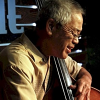Home » Jazz Articles » Album Review » Dave Bass: The Trio Vol. 3
Dave Bass: The Trio Vol. 3
Fast forward to The Trio Vol. 3 wherein Bass is joined by bassist Kerry Kashiwagi and drummer Scott Gordon, along with guitarist Barry Finnerty on several tracks, as they run through a smorgasbord of originals, American Songbook standards and jazz classics all done with imagination and panache. Fittingly the opening track is a Jule Styne/Sammy Cahn number "As Long As There's Music," which was originally introduced by Frank Sinatra in 1944. Ever the innovator, Bass changes the time signature from 4/4 to a jaunty 6/4 thereby shifting the accent variations of the rhythmic figures.
The music of Thelonious Monk holds a special place in Bass' repetoire as he has used one tune on each of his previous trio releases. Here both "Criss Cross'' and "Played Twice" are featured with effective results. On the former, the number's internal metronome provides the foundation for Gordon and Kashiwagi to layer a foundation on which Bass gambols along. The latter is a sly piece, in which each of the participants is given an opportunity to refine the texture of Monk's work. Staying with the jazz composition theme, the trio addresses two classic numbers, namely John Carisi's "Israel" and Tadd Dameron's "If You Could See Me Now." The Carisi composition is a 12-bar minor blues that Bass carries along in a sprightly swinging fashion full of inventive twists. The Dameron tune is given its usual ballad reading, but Bass arranged it as a feature for bassist Kashiwagi. He is full value for being in the spotlight as he demonstrates that each note matters as part of the flow of the arrangement.
Argentinian Astor Piazzolla is considered by some the most influential figure in the history of the tango and his composition "Libertango" is one of his most important. In this interpretation, Bass' trio is joined by guitarist Barry Finnerty, and they capture the ebb and flow of the tango's dramatic quality.
Track Listing
As Long As There's Music; Criss Cross; Endless Waltz; Agenbite Of Inwit; With A Song In My Heart; El Ciego; Israel; Blood; If You Could See Me Now; Played Twice; Libertango; Another Ending.
Personnel
Additional Instrumentation
Barry Finnerty: guitar (4, 11, 12).
Album information
Title: The Trio Vol. 3 | Year Released: 2023 | Record Label: Dave Bass Music
Tags
PREVIOUS / NEXT
Support All About Jazz
 All About Jazz has been a pillar of jazz since 1995, championing it as an art form and, more importantly, supporting the musicians who make it. Our enduring commitment has made "AAJ" one of the most culturally important websites of its kind, read by hundreds of thousands of fans, musicians and industry figures every month.
All About Jazz has been a pillar of jazz since 1995, championing it as an art form and, more importantly, supporting the musicians who make it. Our enduring commitment has made "AAJ" one of the most culturally important websites of its kind, read by hundreds of thousands of fans, musicians and industry figures every month.
























